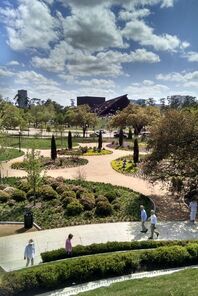 I have always loved the people in the city where I reside. Sure we have our problems as all cities do, but in general folks here are generous, kind, and for the most part, a blessing to one another. Whenever there is a catastrophe Houstonians open their hearts and their arms to help people in need, no matter who they might be.* But even in ordinary situations, it is my experience that conversations with ‘strangers’ are not an unusual occurrence; people are quite friendly. For example, the other day while in a checkout line, the man behind me noticed the peppers I was purchasing and engaged in a conversation about how he loved to roast peppers for his cooking. As I finished my transaction, he smiled and with genuine feeling said, “Have a blessed day!” I responded with “You too,” although what I was thinking was: “Indeed I shall; you have just blessed it.” In retrospect, I wish I had actually said that to him, although I am hopeful that he received the sincerity of my response nonetheless. But it drove home for me that what we do and say does make a difference. Not only did he brighten my day, but he truly blessed me both in the words he offered as we parted and in the friendly ‘welcome’ offered through initiating the short conversation in the first place. There are important lessons here: First, I should have said what was in my heart not only because it was the truth, but because perhaps it would have gladdened his heart more deeply, just as his words had gladdened mine. And second, it underscores the fact that with all the angst and negativity in the world, we definitely need to do much more blessing and a whole lot less cursing. This is not necessarily a reference to our choice of words, though that is also essential to kind interaction; rather, I am referring to our demeanor and the gift we should be to one another. Truly, the world needs more blessings. 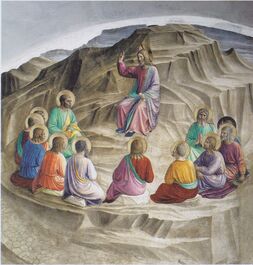 This Sunday was World Mission Sunday, something Pope Francis has spoken about in encouraging evangelization. In fact, the Pope has designated the entire month of October (2019) as Extraordinary Missionary Month. And it should not go unnoticed that the feast of St. Luke the Evangelist is also this month, (October 18), significant because St. Luke was indeed a missionary, given his travels, and that the Gospel he wrote emphasizes the importance of being welcoming to everyone, particularly the outcast, such that they come to know Jesus through offered love and generosity. Luke pointed out that Jesus taught us to be a blessing to one another and to bring blessing to the world through acts of love done without fanfare, but rather with humility and sincerity. At the heart of the message of Jesus is that we love our neighbor as ourselves and that we stretch even further by loving those who are difficult to love. This love includes welcoming the stranger, even if we are in a grocery store checkout line conversing about produce! With every encounter we are to be a blessing to one another, and not a curse. Thus, we become a type of missionary such that we intend to leave others enriched in some way, rather than leaving them worse off, empty, or feeling like they are invisible. And in turn we should receive their welcome with equal sincerity and gratitude. This sort of interaction is how we evangelize: we live the gospel, preaching with our actions, and if we have to, also with our words. ** 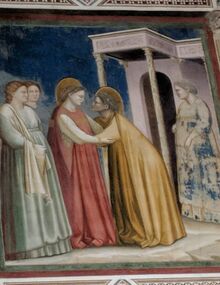 We do not know a lot about St. Luke although there is some information which can be gleaned from the letters of St. Paul as well as what Luke revealed about himself at the beginning of his Gospel. From these we learn that Luke was a physician and that he valued writing in a historically accurate way. He was of pagan Greek origin, but he converted to Christianity after he met Paul, accompanying him on the rest of his missionary journeys. Thus, Luke was a missionary with Paul; of course he ministered to Paul as a physician, but it would be a mistake to characterize Luke as one who wrote but never spoke the message which burned within his heart, especially after spending years with such an outstanding teacher and preacher as St. Paul. In the opening of both his Gospel and the Acts of the Apostles Luke addressed his writing to “Theophilus,” (lover of God). From this we can assume that Luke was writing to a community that was familiar with him, and had therefore heard him preach. And finally, while Luke never met Jesus, there is evidence that he knew Mary, ‘interviewing’ her at length. This would explain why his Gospel contains more about Mary than any other. The detail and intimacy with which he described the Annunciation and the mysteries of the birth of Jesus indicates that he had firsthand knowledge which could only have come from her. 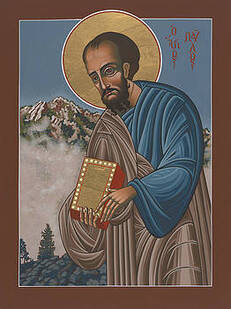 Of the themes of Luke’s Gospel, one which stands out is the inclusiveness of Jesus, whose love was not limited to the Jewish people who were awaiting the Messiah. It is clear from Luke that Jesus put emphasis on His love for the poor, sinners of every type, women, (especially widows), the outcast, lepers, and foreigners (Gentiles); that is, all those people marginalized by the Jewish culture. This Gospel teaches that love is about welcome and being a blessing, so that just as Jesus welcomed everyone, so too should His disciples. It is about opening one’s heart to everyone, not just those who are easy to love, but also the ones who pose the greatest challenge. Thus, all are invited, all are welcomed, and all are loved by God no matter who they are, where they come from, what their background, or what their past history may have been. It is obvious that Luke took to heart the teaching of Paul who said that there was no longer Jew or Greek, man or woman, free or slave, but all were one in Christ. (Gal 3:28) The only way for this to be lived is be intentional in what we say and do, so as to be a blessing to those we meet. 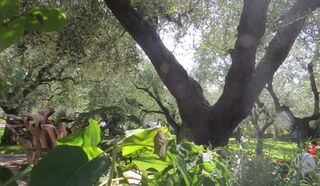 Luke knew, and therefore emphasized, that to be a disciple of Christ we must invite the unwelcomed (Lk 5:27-32), heal the wounded (4:38-41), find the lost (15:1-32), offer peace to the disquieted (4:31-37), forgive those who have wronged us (17:3-4), and offer what we can to the poor (16:19-31). This means we must first accept these gifts of God ourselves so that we can offer them to others. Once we realize the mercy with which we have been forgiven and loved, we will find it easier to welcome others as we have been welcomed. Furthermore, nowhere in the Gospel is anyone ever expected to be perfect. As we have seen, Jesus offered great mercy to the habitual sinner. Luke makes it abundantly clear that perfection is not a criterion for entering the Kingdom of God, and thus it is not required for one to be a disciple.*** However, what is essential is how well we attempt to love our neighbor without distinction: friend, foe, and stranger alike. Clearly, the Gospel is about having an open heart, welcoming all we meet, and being a blessing rather than a curse in whatever setting we may find ourselves. 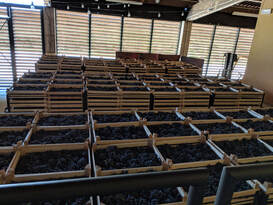 What we learn from Luke, (and from the Church designating World Mission Day), is that we are to be missionaries of blessing here and now; we do not have to travel like Luke or Paul. In fact, before we can go to a far-off land, if that is our call, we must learn to love at home. The effect of all our loving actions, no matter where we are, is real. This means that we are to be a blessing in the little things we do on a daily basis and that if an opportunity presents itself, we should say and do what is in our heart so that we do not regret kind words unspoken or works of mercy undone. The work of blessing does not have to be something outside our ability; it is not about writing a theological masterpiece, but it is about being a missionary of love, which in itself is a theological masterpiece. It is not about spending hours on our knees, but it is about the fruitfulness of our time of prayer leading us to action. It is not about doing miraculous works, but it is about sharing with others and letting love work the ‘miracle.’ It is important to take to heart the message of Jesus that this is our call, offering blessing in place of curse, joy instead of loneliness, and kindness where there may be emptiness. Let us think of ourselves as true disciples, those who are called to act as missionaries of blessing and evangelists of love, just as St. Luke emphasized in his Gospel. This is indeed what Christ asks of those who love Him: it is how we share the Good News to the ends of the earth. 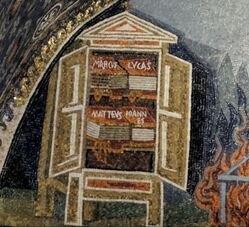 May we take up the call of Jesus as missionaries of blessing and evangelists of love! May we ask for the graces we need to live as true disciples of Jesus! May we take to heart the Gospel of Luke and the emphasis Jesus puts on welcoming all those who are marginalized or outcast! May we spend time in prayer for the needs of the world, to come to know and love Jesus better, and to better recognize the opportunities which come daily to be a missionary of blessing! And may we learn to value with gratitude the kindness, mercy, compassion, peacemaking, justice, generosity, and forgiveness which are offered to us by God so that we in turn, may offer these to others! Let us continue to meet in the heart of Jesus! Peace! ©Michele L. Catanese Notes: This entire blog, Heart Speaks to Heart, is the result of the wisdom and encouragement offered to me by Joanne Knowles, my long time spiritual director and dear friend. She passed away this past week, so while I know she is rejoicing with God and all the holy ones, please pray for the repose of her soul and also for her family. For years Joanne encouraged me to write and she kept a copy of every single blog entry ever posted here! Fittingly, there is an early entry in which I wrote about her. It can be found in my Archives from November 2012, or you can click here: https://www.catanesesd.com/micheles-blog/the-gift-of-an-anam-cara Rest in peace, Anam Cara! Next post November 4 * After disasters in many places around the country and the world, not just here in Houston, Houstonians are quick to share their money, goods, and hard work to help others. It is very impressive and inspiring. During a crisis no one asks about the politics, religion, race, or creed of those who are in need: they help all equally. I must also mention that recently one of our deputies, Sandeep Dhaliwal, (a trailblazer as the first Sikh deputy to wear a turban on duty), a beloved, courageous man who cared deeply for the people of this city, was murdered during a traffic stop. The people of Houston honored him and continue to mourn his loss; another touching example of the love and care of this community. ** This is a paraphrase of a quote often attributed to St. Francis of Assisi as he missioned the friars to serve in the community. *** Read Luke’s writing and count how many times Jesus ate and drank with so-called sinners, put Himself into the presence of a demoniac in order to set him or her free, or healed the servant of an ‘enemy’ (such as the Roman centurion); count how many times He chose to be with those who cheated others such as Levi (Matthew) and Zacchaeus, forgave those who wronged Him, and had patience with those who simply could not understand what He was trying to say (not just the Pharisees, but often the apostles!) Thus it is obvious that He did not seek perfect people, nor did He ask anyone He associated with to be perfect. But He did offer them healing, hope, and the freedom which would start them on the path to holiness, clearly outlining what was expected of those who committed to Him. Images: 1. My photo, taken in Hermann Park, Houston: It seems fitting to use one of the prettiest parks in Houston to highlight my hometown, mentioned in the opening example. 2. Painting, Sermon on the Mount, Blessed Fra Angelico: Bl. Fra Angelico is one of my favorite artists because his works convey a holiness and beauty which I believe is unrivaled. I chose this mostly because Jesus is teaching His disciples not only so they understand His message, but so that they become missionaries of love and blessing through their word and deed. 3. My photo of a fresco, The Visitation by Giotto, located in the Scrovegni Chapel, Padua, Italy: The highlight of a recent trip to northern Italy was the Scrovegni Chapel. If you have followed my blog for any length of time you will have seen that I love Giotto. For many years I had wanted to see the frescoes in person, and it was a blessing, indeed. I chose to use this image because it is of Mary who at the Visitation acted as a missionary of love and blessing to her older cousin Elizabeth. It was as if Mary was 'preaching the gospel' yet unspoken, given that she was still pregnant with Jesus. 4. Icon, St. Paul the Apostle, by Fr. William Hart McNichols: This icon depicts Paul with the gospels, that is, as a missionary who brought the Good News in his many travels, (hence he was evangelizing.) You can find it at https://fineartamerica.com/featured/st-paul-the-apostle-196-william-hart-mcnichols.html 5. My photo, Masi Vineyards, Veneto, Italy: I chose this photo taken within an olive grove because it was a place of beauty and peace. The light streaming through the olive grove and the stump of what seemed to have been an ancient olive tree remaining among the living, vibrant trees conveyed a sense of life and hope. 6. My photo, grapes drying at the Masi Vineyard: These grapes were in the first step of the wine making process. The bounty of the harvest was what struck me. Along with the olives in the previous photo, it seemed to speak of the miracle, if you will, of taking the fruit and crushing it so that it can 'rise to new life' after a period of transformation, (metaphorically and symbolically speaking). This message is the heart of the gospel and it is through our love that we help others in this process of trusting that God is with them and that new life awaits all those who commit to Him. 7. My photo, taken in the baptistery at San Vitale Cathedral, Ravenna, Italy: This is a close-up of part of a huge mosaic. On the left side of the mosaic was this open cabinet with the four books of the Gospels displayed, which you can see if you look closely. It seemed a fitting way to end this entry. NOTE: In compliance with GDPR rules, I wish to make it clear that I do not gather any information on any of my readers at any time.
Joan Barry
10/24/2019 11:18:15 am
Wonderful instructions for the way to live each day, the loving attitudes for spreading God's love and enjoying life with those around us. Comments are closed.
|
Heart Speaks to Heart
|

 RSS Feed
RSS Feed

